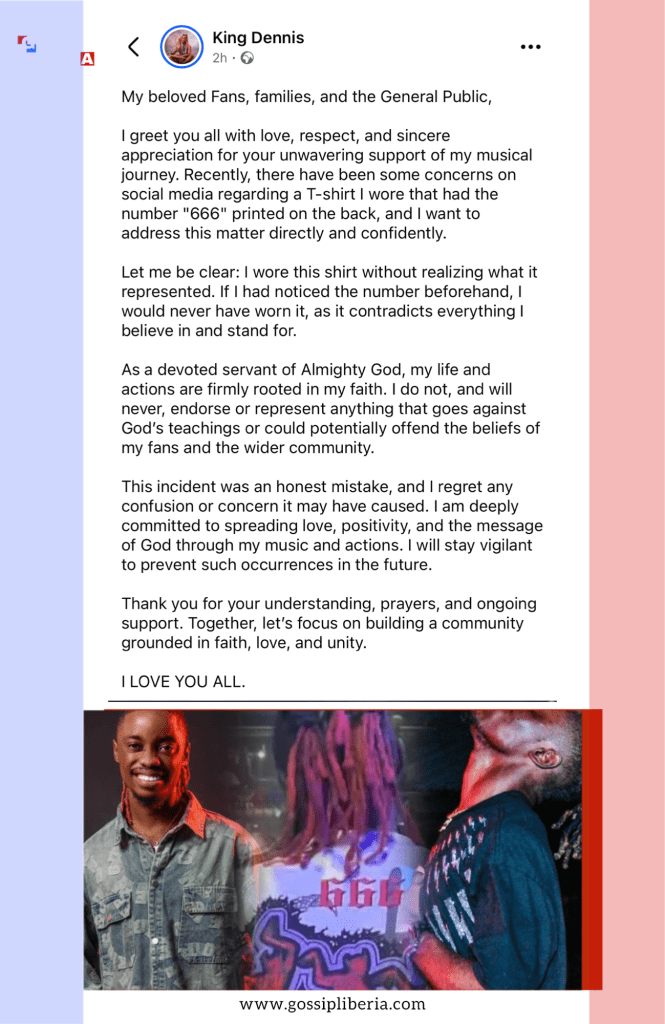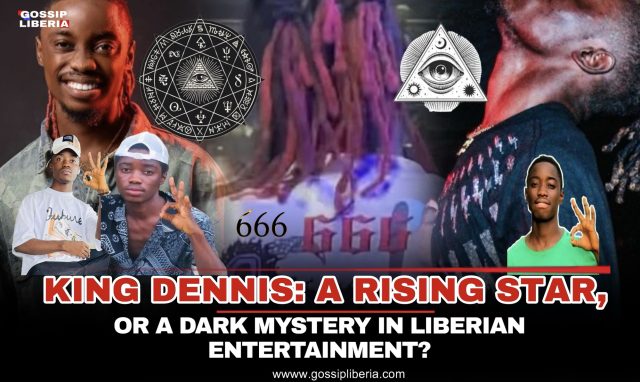Fans Question the True Intentions Behind King Dennis’ Career as Controversy Surrounds His Music, Manager, and Mysterious Symbolism.
The Hidden Layers of Liberia’s Entertainment Scene
Liberia’s entertainment industry has long struggled with global recognition, with many of its brightest stars failing to achieve the wealth and accolades that their talents deserve. This disparity raises an unsettling question: Why are Liberian entertainers not thriving financially or receiving international acclaim?
Some artists have chosen to confront these challenges head-on, breaking out of the local mold and seeking global relevance. Among these artists is King Dennis, a name that sparks debate as much as admiration. But behind his catchy beats and ambitious moves lies a story that has fans and critics alike asking: What is King Dennis’ ultimate agenda?
Faith or Facade? The Mystery of “My Way Yaah”
King Dennis’ hit song from December 2024 “My Way Yaah” took the Liberian music scene by storm, blending references to Yahweh, Jesus, and other divine figures. However, fans remain divided over the song’s true spiritual message.
“King Dennis uses names like ‘Yahweh’ and ‘Je sus’ to deliver his message,” one fan commented, “but his lyrics feel intentionally vague, almost as if he’s playing both sides.”
Such ambiguity fuels speculation about the artist’s beliefs and intentions. Is King Dennis genuinely inspired by faith, or is he cleverly using religious symbolism to expand his audience base?
Success or Strategy? A Managerial Power Play
Last year, King Dennis’ manager publicly praised the artist for his discipline and work ethic. However, whispers from insiders suggest the dynamic between the two might be more complex than it seems.
A new car, heavily featured online, raised eyebrows. Was it a gift from the manager to the artist, or vice versa? When questioned, the manager responded cryptically, saying, “I applaud bloggers for making me look big when I’m not even that way.”
This left fans speculating: Who’s really in control—King Dennis or his manager?

The Mark of the Beast: A Symbolic Slip or Intentional Move?
The controversy took a darker turn recently when King Dennis appeared in public wearing a shirt emblazoned with satanic imagery, including the infamous “666,” a symbol often associated with the mark of the beast from the Bible’s Book of Revelation.
The design was clear, bold, and unmissable. Fans were stunned. While some defended the artist, claiming he was unaware of the shirt’s meaning, others questioned whether the choice was accidental at all.
“The shirt didn’t just have random patterns; it was deliberate,” one concerned fan noted. “He wore something that screamed ‘dark symbolism,’ and now we’re supposed to believe he didn’t know?”
This isn’t the first time King Dennis has flirted with controversy. His early track, “Trouble Coming,” seems almost prophetic in hindsight, warning listeners of impending chaos.
Decoded Lyrics and a Cry for “Glapor”
King Dennis’ music often contains coded messages that many fans struggle to understand. The term “Glapor,” featured in one of his recent tracks, has left listeners puzzled. Some fear it signifies a pact or a submission to an unnamed force, while others see it as a mere artistic expression.
However, the real question remains: Is King Dennis playing into his audience’s religious sensitivities, or has he genuinely sold his soul to achieve fame?
A Hard Message for the Liberian Music Industry
King Dennis’ journey reflects deeper issues in the Liberian entertainment landscape. From a lack of financial stability to the global disregard for local talent, many artists find themselves trapped in a system that offers little reward. Some, like King Dennis, appear to take risks—whether spiritual, artistic, or strategic—to rise above these challenges.
Yet, these risks come with consequences. Is King Dennis a misunderstood genius paving his way to global fame, or a calculated figure navigating a path that blurs the line between light and darkness?
For now, fans can only watch as his story unfolds, but one thing is certain: Liberia’s entertainment scene will never be the same.

The Scary Side of Entertainment Symbols
The mark of the beast (666) is not just a biblical reference; it has become a cultural symbol, often associated with power, fame, and dark pacts. In the music industry, such symbols have been linked to secret societies and the idea of selling one’s soul for success.
For an artist like King Dennis to wear this symbol, whether intentionally or accidentally, is a bold move that cannot be ignored. It serves as a stark reminder of the sacrifices some may make—or be accused of making—in their pursuit of greatness.












